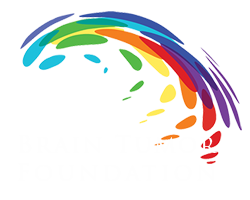clinical trials
While there are many drugs and other therapies now available to treat brain tumors, the continuance of research and clinical trials is necessary to keep pioneering newer – and better – treatments for this disease. Are any of these trials right for you?
Understanding what a clinical trial is can help you decide if it might be an option for you.
Clinical Trials
Clinical trials are the cornerstone of cancer care – drugs and procedures currently used to treat cancer have to be proven to be safe and effective.
This is why volunteers for clinical trials are closely screened and monitored by their physicians, so treatments can be refined to be the most effective and safest possible. As a brain tumor patient, navigating the process of qualifying for clinical trials can seem mysterious and confusing. It is important to understand the elements that comprise clinical trials.
There are treatment trials – to evaluate whether a new drug, surgery or radiation therapy (or a combination) has a higher success rate than current treatment options. Next are quality-of-life trials – which focus on improving quality of life issues and treatment-related symptoms. And there are prevention, screening and diagnostic trials – which focus on ways to reduce the chances of getting cancer.
Randomized controlled clinical trial
A computer determines the treatment each study participant receives. This ensures that there is no bias in the selection of treatment and that every participant has the same chance of being selected for either the experimental treatment arm (the treatment under investigation) or the standard treatment arm (the usual treatment given for a disease, to which the experimental treatment is being compared). At the end of the trial, the treatment assignments are revealed and researchers can identify whether the experimental treatment was more effective than the standard treatment, and also can compare the side effects of each treatment.
Double-blind clinical trial
In a double-blind trial, neither you nor your oncologist will know whether you are receiving the experimental or standard treatment. At the end of the trial, the study is “unblinded” and it is revealed which treatment was received by each participant.
Placebo
A placebo is a substance that is given in place of the experimental treatment, but in fact has no active ingredients. Neither patients nor the oncologist will know which treatment a participant is receiving. Of course if a patient truly needs active treatment, a placebo alone would not be given. It might be given in addition to a standard treatment, to see if the combination of the experimental treatment with the standard treatment is more effective than the standard treatment alone.
Phases of Clinical Trials
The four phases of clinical trials give researchers a systematic way to learn about and understand the treatments while keeping those patients participating as healthy as possible.
Invisible First Item
PHASE I
PHASE II
PHASE III
Trials in this phase continue to evaluate safety as well as considering the safety and efficacy of combining treatments – such as radiation and surgery or some other simultaneous procedures. If and when results of a Phase III trial proves the new treatment is deemed safe and beneficial – meaning it outweighs the risks – the FDA will then decide whether the treatment will be approved and made available to everyone.
PHASE IV
Participation in Clinical Trials
Before you decide to participate, it is important to do your own research. Speak to other patients to learn about the pros and cons of volunteering for clinical trials.
Never trust your fears. They don’t know your strength.
– Athena Singh
Choosing to participate is not only a proactive role on your part but could potentially benefit and save so many future patients suffering from brain tumors. It is suggested that if your physician does not recommend applying for a clinical trial that you seek a second opinion if this is a course of action you feel is right for you.
The potential risks are weighed against potential benefits. This is why a lot of patients are skeptical of signing up for these trials. But participation is always voluntary and the patient can always withdraw if they feel it best for them. Furthermore, the decision to volunteer or withdraw has absolutely no effect on the patient’s routine medical care.
Risks
Many patients recognize the potential benefits of a clinical trial but are frightened of the risks that may be involved. Patients sign an agreement stating that they know of the potential risks, but withdrawal from the trial is within their right at any point in time – whether it is because they are experiencing too many side effects or are just not happy with the treatment results.
- What is the purpose of the trial?
- What kind of tests and treatments are involved in this trial?
- What are the side effects/risks of this trial? The benefits?
- How will I know if the treatment is effective and how will I get the trial results?
- Will I have to be in the hospital or clinic often?
- Is it permissible to speak with another patient who has been in the trial?
- Am I assured privacy of my health information?
- What happens if I decide to leave the trial?
- Will insurance cover any of the costs of the trial?
Newly Released
Options to Consider
Amedeo.com
Provides free access to medical studies from hundreds of journals supported by unrestricted grants from several drug companies.
www.amedeo.com
Brain Tumor Trials at Weill Cornell Medicine
www.weillcornellbrainandspine.org
CancerTrialsHelp.org
www.cancertrialshelp.org
Current Trials at Mayo Clinic
Clinical trials at Mayo Clinic.
www.mayo.edu
Clinical Trials at Perlmutter Cancer Center
www.nyulangone.org
Clinical Trials Offered in the US
www.cancer.gov
Clinical Trials run by MD Anderson
www.mdanderson.org
CureBrainCancer.org
Clinical trials funded by Cure Brain Cancer Foundation.
www.curebraincancer.org.au
Current Clinical Trials at Duke University
www.dukehealth.org
Current Trials at Johns Hopkins Medicine
Current Clinical Trials
Current Trials at Mayo clinic
www.mayo.edu
Current Clinical Trials at the Cancer Research Institute
www.cancerresearch.org
CenterWatch.com
Lists more than 41,000 active industry and government-sponsored clinical trials; sponsored by company that recruits participants.
www.centerwatch.com
Mass General
Mass General Cancer Center provides access to a wide variety of clinical trials.
www.massgeneral.org
Mass General
Mass General Cancer Center provides access to a wide variety of clinical trials.
www.massgeneral.org
Medifocus Digest Alert on Glioblastoma
A free expertly selected listing of the latest medical journal articles published in Medline with direct links to the specific article abstracts focusing on cutting edge research, clinical trials, and the latest treatment advances.
www.medifocus.com
MedlinePlus.gov
The National Library of Medicine’s consumer site with a link to PubMed, its bibliographic database with citations and abstracts from nearly 4,500 journals world-wide.
www.medlineplus.gov
Memorial Sloan-Kettering
www.mskcc.org
Neuro-oncology Clinical Research and Trials
www.dana-farber.org
Research and Clinical Trials at Lenox Hill Hospital-Norwell Health
www.lenoxhill.northwell.edu
The Trial Matching & Referral Service
The Trial Matching & Referral Service at The University of Pennsylvania Cancer Center allows patients to complete a single questionnaire and determine their eligibility to participate in any ongoing clinical trials.
www.oncolink.org
TrialsCentral.org
The trial listings site of the Center for Clinical Trials and Evidence-Based Healthcare at Brown University Medical Center.
www.trialscentral.org
VirtualTrials.com
Records and analyzes the outcomes of your treatments, enabling researchers to quickly identify which treatments or combinations of treatments look the most promising.
www.virtualtrials.com

Call for a referral

Stay informed
Sign up for BTF news and events

Donate
Help us help others
